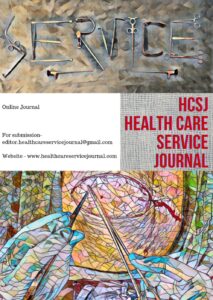Otolaryngology Rural Camps in India: Evolution of Patient Profiles, Behavior, Expectations, and Disease Trends
Abhishek Sharma (Consultant, Sekhsariya Hospital, Chirawa)
Year: 2025, Volume: 2, Issue: 1, e-HCSJ 0025, Date of Publication: 31 May 2025
Multidisciplinary Online Journal
Open Access (OA) journal
Published quarterly
Starting Year-2024
2024-2025 - Volume 1
2025-2026 - Volume 2
Articles related to Hospital, Healthcare, All Medical disciplines, All Management discipline, Service marketing , Service Industry, Sustainability, Financial management, Workforce management and so forth
Submissions Open for Volume 2 Issue 1

Update-
4 June 2025
National Black Mental Health Professionals Day
History –
Just for Information!!
4 June
1906 Rocky Mountain Spotted Fever caused by a microbe is spread by ticks discovered by pathologist Howard T. Ricketts
We are proud to celebrate the successful completion of the first year of Healthcare Service Journal. This milestone marks the commencement of our scholarly endeavor, with the dissemination of impactful research and insightful perspectives within the realm of healthcare services.
Abhishek Sharma (Consultant, Sekhsariya Hospital, Chirawa)
Year: 2025, Volume: 2, Issue: 1, e-HCSJ 0025, Date of Publication: 31 May 2025
Gaurav Trivedi (MBA Product Manager IBM)
Year: 2025, Volume: 2, Issue: 1, e-HCSJ 0024, Date of Publication: 31 May 2025
Harish Verma (HOD Dept of Anaesthesia NWR Central Hospital)
Year: 2025, Volume: 2, Issue: 1, e-HCSJ 0023, Date of Publication: 31 May 2025